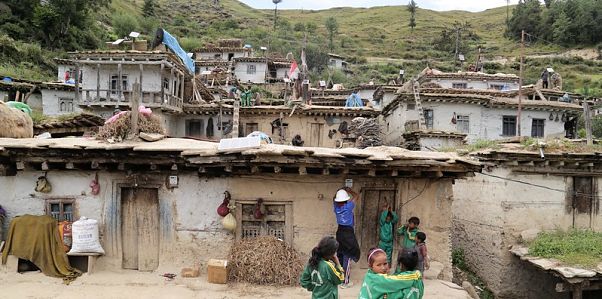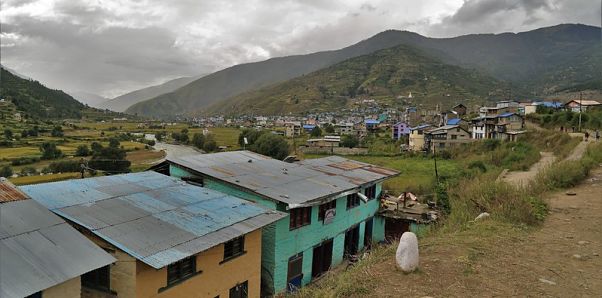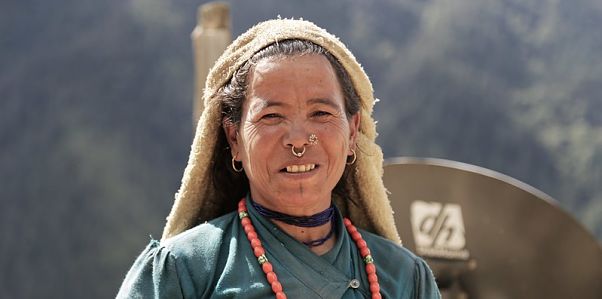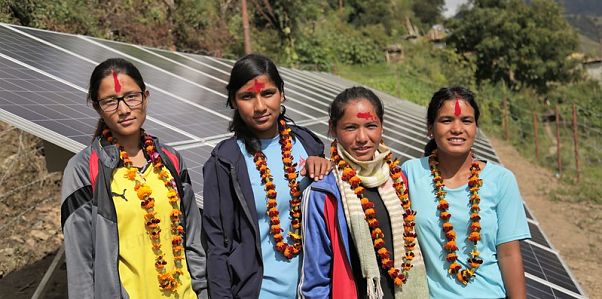 Jodhgaun is a remote village located in the Jumla district of western Nepal, sitting at just over 10,000 feet in elevation. The village is home to approximately 100 households and 800 people. Most families are subsistence farmers and some earn a small income through apple farming and the sale of wool crafts, livestock, and crops such as beans and potatoes. There is a K-5 primary school in Jodhgaun, as well as a community center, and a recently constructed birthing center a 15-minute walk from the village. In June 2019 GRID installed solar on the birthing center so that it can now power lighting and electric medical equipment, providing higher quality maternal and healthcare services 24 hours per day.
Jodhgaun is a remote village located in the Jumla district of western Nepal, sitting at just over 10,000 feet in elevation. The village is home to approximately 100 households and 800 people. Most families are subsistence farmers and some earn a small income through apple farming and the sale of wool crafts, livestock, and crops such as beans and potatoes. There is a K-5 primary school in Jodhgaun, as well as a community center, and a recently constructed birthing center a 15-minute walk from the village. In June 2019 GRID installed solar on the birthing center so that it can now power lighting and electric medical equipment, providing higher quality maternal and healthcare services 24 hours per day.
 Due in large part to its remoteness and the difficult mountainous terrain, the national electric grid does not reach Jodhgaun, nor any part of the Jumla district. Jumla Bazar and some other towns and villages in Jumla receive electricity from small hydropower plants, but there is no centralized source of electricity in Jodhgaun. Families rely primarily on very small 20W stand-alone solar panels, flashlights, or kerosene oil lamps for lighting and electricity, which are expensive and unreliable, and have adverse effects on health.
Due in large part to its remoteness and the difficult mountainous terrain, the national electric grid does not reach Jodhgaun, nor any part of the Jumla district. Jumla Bazar and some other towns and villages in Jumla receive electricity from small hydropower plants, but there is no centralized source of electricity in Jodhgaun. Families rely primarily on very small 20W stand-alone solar panels, flashlights, or kerosene oil lamps for lighting and electricity, which are expensive and unreliable, and have adverse effects on health.
 In September 2019, GRID brought reliable electricity access to the village of Jodhgaun with the installation of a 12kW microgrid. The microgrid will allow households to share energy generation and storage so they can maximize the benefits of solar. Access to clean, reliable electricity will provide families with safer, higher quality lighting for reading and studying at night, and the ability to plug in electric appliances that can give families better access to news, entertainment, and income generating opportunities. The microgrid will also have the capacity to power an electric grain mill, which will save families time and money traveling to grain mill in neighboring villages and will generate revenue for the community, households will be able to power lighting and a community grain mill.
In September 2019, GRID brought reliable electricity access to the village of Jodhgaun with the installation of a 12kW microgrid. The microgrid will allow households to share energy generation and storage so they can maximize the benefits of solar. Access to clean, reliable electricity will provide families with safer, higher quality lighting for reading and studying at night, and the ability to plug in electric appliances that can give families better access to news, entertainment, and income generating opportunities. The microgrid will also have the capacity to power an electric grain mill, which will save families time and money traveling to grain mill in neighboring villages and will generate revenue for the community, households will be able to power lighting and a community grain mill.
Local Nepali women joined GRID and partner Gham Power to install the microgrid system itself as a hands-on training opportunity in solar installation, and part of GRID's Women in Solar Nepal Program. This is the third microgrid that GRID has installed in Nepal, following the installation of a microgrid in Dhapchung, Sindhupalchok in 2016 and a microgrid in Chatang, Nuwakot in 2018.
 This project was sponsored by Google Cloud, and it is through their generous philanthropic support that GRID was able to bring a microgrid to the village of Jodhgaun. Members of Google's team and partners joined GRID in Nepal to visit the community of Jodhgaun and to participate in the completion of the installation.
This project was sponsored by Google Cloud, and it is through their generous philanthropic support that GRID was able to bring a microgrid to the village of Jodhgaun. Members of Google's team and partners joined GRID in Nepal to visit the community of Jodhgaun and to participate in the completion of the installation.
See photos from the installation!
Corporate sponsorships are critical in enabling GRID to bring the benefits of solar- financial savings, job opportunities, and a clean, renewable energy source- to families and communities that would not otherwise have access. Learn more about becoming a corporate sponsor for our international projects.

